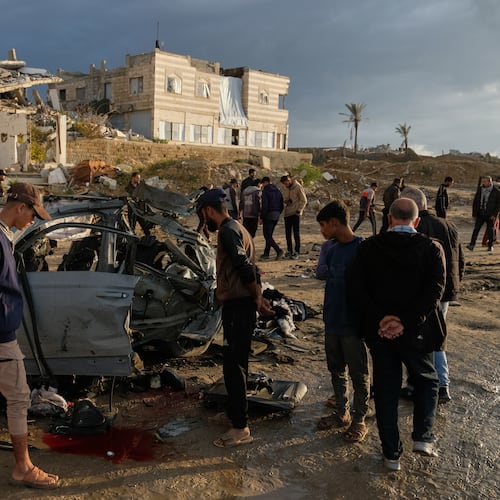While establishing himself as one of classical music’s leading talents, Atlanta-based Syrian composer Malek Jandali has focused on spreading a message of peace. Revered by the Syrian exile community, he established a reputation as “the musician of the revolution.”
Lately, Jandali says he has been shedding tears while playing the piano.
“They’re tears of joy, total joy,” he said.
Over the weekend, the Syrian revolution came to a triumphant end, as rebel forces swiftly seized control of Damascus, ushering the fall of more than 50 years of repression and violence under the Assad family’s brutal dictatorship.
“The Syrian people today are free,” Jandali said. “Just a few days ago, they were all prisoners of injustice. Today, they have hope.”
Led by the armed Islamist faction Hayat Tahrir al-Sham, the lightning offensive that swept through Syria’s biggest cities came in the wake of a grueling 13-year civil war that claimed hundreds of thousands of lives and displaced millions.
Jandali is intimately familiar with the pain inflicted by former president Bashar al-Assad — now in exile in Russia — on the Syrian people.
In 2011, when the uprising began, Jandali staged a high-profile performance at the White House of a composition he created inspired by the protests that were filling streets across his homeland. “I Am My Homeland,” or “Watani Anna,” became an anthem for the revolt. Days after the D.C. performance, Jandali’s parents, still living in Syria, were severely beaten by Assad forces.
Credit: Photo by Dan Carmody
Credit: Photo by Dan Carmody
Among Jandali’s wishes for Syria’s future is that its citizens will be better able to preserve the country’s rich culture — something he has striven to do from the U.S. through symphonic music.
“There’s no true art without freedom,” he said. “How can you create if you don’t have freedom of expression and human rights?”
Jandali hopes to soon be able to perform in Damascus’ opera house, as well as in its streets and public squares. He says he might even extend to his homeland his Pianos for Peace program, which places and maintains colorful pianos in public spaces in Atlanta.
“Music unites people,” he said.
Way forward unclear, but hope is strong
Emad Sabbah is president of Ethaar, a Clarkston-based nonprofit that serves local refugees and underserved families. He previously founded Georgians for Syrian Refugees.
“I’ve been talking to a lot of refugees who are just crying. They can’t believe that [the dictatorship] is over,” he said.
Having acquired refugee status because they faced persecution at home, many of the Syrian refugees living in metro Atlanta have lost loved ones to the Assad regime, Sabbah said.
For them, the regime’s fall “feels almost too good to be true.”
The dictatorship’s ouster is already causing some to start envisioning a move back.
“These are people who came to America to try to rebuild themselves, to raise families. And now they’re asking, should they go back? Should they stay here? It’s a lot of new things,” Sabbah said. “I could see some people leaving and going back there. I could see that.”
The appeal of a potential return to Syria is felt strongest among older refugees, whom Sabbah said have had more trouble assimilating.
“It’s been a struggle for them to learn the language. It’s been a struggle for them to get jobs. And they all have PTSD. It’s been a struggle. I could see a scenario in which the young ones stick around, but the older generation goes back.”
Ibrahim Jouja, an Emory University senior and the son of Syrian immigrants, was at a birthday party over the weekend when he got news via text that Damascus had fallen. He quickly left to jump on a phone call with relatives. Later, he joined a celebration at a local Syrian restaurant, where people danced in the parking lot.
The toll the war has taken on Jouja’s family is severe, with several of his cousins gone missing — like thousands upon thousands of others in Syria.
This week brought a long-awaited wave of relief.
“Speaking with [relatives in Syria] on the phone, you can just tell in their voices that the tension that’s been there since the beginning of the war, that’s finally gone. They can truly, truly breathe and speak freely. They’re celebrating on the streets,” Jouja said. “It’s just so much relief and so much joy, because for 50 years people have been scared and intimidated by this regime.”
Like many Syrians and Syrian Americans, Jouja is aware that the situation in Syria remains in flux, with few if any certainties for the future.
The power vacuum left after the Assad regime’s rapid collapse led to fresh fighting among armed groups in the country. In northern Syria, forces backed by the U.S. have been clashing against those backed by Turkey.
Efforts at stability through diplomacy have been complicated because Hayat Tahrir al-Sham, which led the rebellion and was once linked to al-Qaida, is designated as a terrorist group by both the U.S. and the United Nations. Meanwhile, Israel has launched hundreds of strikes on Syrian military assets.
Still, people like Jouja are falling on the side of hope. They have been moved by heart-rending images of political prisoners emerging from some of Syria’s most notorious prisons and back into freedom.
“Nothing could be worse than Assad,” Jouja said. “No matter what happens, anything will be an improvement.”
Like Jouja, Serene Hawasli also grew up in the U.S. to immigrant parents from Syria. Until the beginning of the civil war, Hawasli, a Johns Creek resident, traveled to Syria to visit family up to two times per year.
“We were taught at a very young age, ‘Don’t speak about the government. The wall has ears, you can’t say anything, or you’ll be imprisoned. Even kids, they don’t care who you are,’” she said. “I was just watching a lot of videos this past weekend [of prisoner releases] and just crying of joy.
“Syrians have not been used to good news the past few decades.”
Now Hawasli has children of her own. Her second daughter, who is 14, has never been to Syria, but she’s long expressed a desire to visit.
“She said: ‘I want to see where I’m from, originally.’”
Hawasli had been telling her a trip back would not be viable under Assad.
“Now, she is like: ‘Mama, can we buy a ticket?’”
About the Author
Keep Reading
The Latest
Featured



